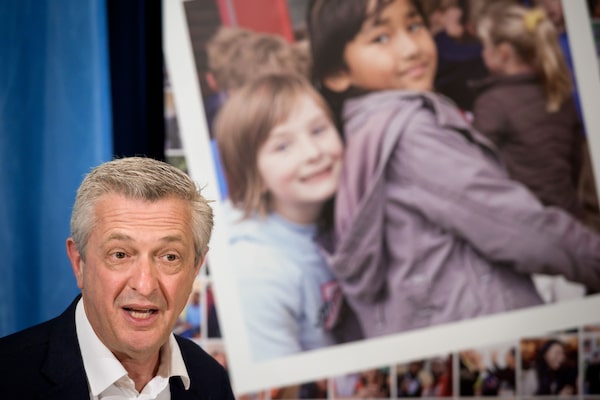
United Nations High Commissioner for Refugees Filippo Grandi, seen here, said the figures confirm a 'longer-term rising trend in the number of people needing safety from war, conflict and persecution.'FABRICE COFFRINI/AFP/Getty Images
The number of people forcibly displaced by war, conflict and persecution around the world topped a record-setting 70 million in 2018, including nearly 26 million refugees, according to a new report from the United Nations Refugee Agency.
However, only 92,400 refugees permanently resettled in a new country, according to the annual global trends report from the Office of the United Nations High Commissioner for Refugees (UNHCR). The agency applauded Canada for welcoming nearly a third of the world’s resettled refugees – 28,100 people – and encouraged it to continue to set an international example amid the “toxic and misleading narratives against displaced people” around the world.
“We need Canada more than ever,“ said Jean-Nicolas Beuze, the UNHCR’s representative in Canada, in an interview.
“It’s an important signal to the rest of the world because it’s telling political leaders, but also opposition, that there’s a way to remain compassionate, there’s a way to remain engaged on these issues and address the fears the we hear among the public.”
Mr. Beuze thanked Canadians for their generosity to refugees. Two-thirds of the resettled refugees who arrived in the country last year were privately sponsored by Canadian citizens, according to the UNHCR.
Canada was the first country in the world to adopt a refugee system where private citizens and community groups can sponsor refugees from abroad; the program celebrated its 40th anniversary this year. Other governments have adopted similar models, but Mr. Beuze said Canada’s program needs to be replicated in more countries.
For the first time, Canada resettled more refugees than the United States, which welcomed the second-largest number of refugees at 22,900 in 2018, according to the UNHCR. Other countries that accepted large numbers of resettled refugees included Australia at 12,700, Britain at 5,800 and France at 5,600.
Refugees account for just over a third of people displaced around the world last year. The report found that another 41.3 million people were internally displaced in 2018, but are not considered refugees because they were not forced to flee their country.
Over the past decade, the total number of forcibly displaced people has grown significantly from 43.3 million in 2009 to 70.8 million last year – the highest level since the Second World War. The likelihood of people being forcibly displaced has increased substantially in recent years, from 1-in-160 a decade ago to 1-in-108 in 2018.
“What we are seeing in these figures is further confirmation of a longer-term rising trend in the number of people needing safety from war, conflict and persecution,” the United Nations High Commissioner for Refugees, Filippo Grandi, said in the report.
The report said most of the increase was driven by the Syrian civil war between 2012 and 2015, but conflicts in other countries, including Yemen, South Sudan, Myanmar and, most recently, Venezuela, have also contributed to the rise in the number of displaced people.
Venezuela is home to what the UNHCR describes as the world’s fastest-growing displacement crisis, with more than four million people having fled the country since 2015. Venezuela has suffered economic collapse under President Nicolas Maduro, with inflation topping one million per cent. Widespread food and medicine shortages have led to a humanitarian crisis.
Mr. Beuze called for global solidarity in finding solutions to the growing number of displaced people. He said western countries, including Canada, must take some of the burden off of nations hosting most of the world’s refugees, such as Lebanon and Bangladesh, by helping to resettle asylum seekers and find political solutions to crises. On average, high-income countries host 2.7 refugees per 1,000 people, compared to 5.8 in middle- and low-income countries, according to the UNHCR report.
“We need more political will to resolve the root causes of displacement, whether it’s conflict, whether it’s a lack of development benefits, whether it’s discrimination between different groups in the countries of origin," Mr. Beuze said.